We’re almost there– it’s down to the final ten. Starting with:
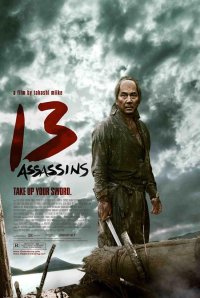 10) 13 Assassins: “While the plot that subsequently comes together falls within the bailiwick typical to most men-on-a-mission films as Shinzaemon collects his chosen warriors– a motley crew of samurai ranging in age and experience, which eventually also comes to include a hunter (Yusuke Iseya) who may be more than he seems– and prepares for battle, 13 Assassins is anything but average. In fact, rather than play as an amateur-hour riff on a classic, Miike’s film stands out as a bold, extremely well-made and completely worthy successor to the films of Kurosawa. Miike’s priorities may have shifted in this stage of his filmmaking career, but he’s lost none of his artistic verve or narrative ability, and he brings both to bear to weave a thoroughly satisfying tale about the nature of honor, duty, loyalty, and human conflict, with a pinch of class war to add a little spice to his jidaigeki cocktail.”
10) 13 Assassins: “While the plot that subsequently comes together falls within the bailiwick typical to most men-on-a-mission films as Shinzaemon collects his chosen warriors– a motley crew of samurai ranging in age and experience, which eventually also comes to include a hunter (Yusuke Iseya) who may be more than he seems– and prepares for battle, 13 Assassins is anything but average. In fact, rather than play as an amateur-hour riff on a classic, Miike’s film stands out as a bold, extremely well-made and completely worthy successor to the films of Kurosawa. Miike’s priorities may have shifted in this stage of his filmmaking career, but he’s lost none of his artistic verve or narrative ability, and he brings both to bear to weave a thoroughly satisfying tale about the nature of honor, duty, loyalty, and human conflict, with a pinch of class war to add a little spice to his jidaigeki cocktail.”
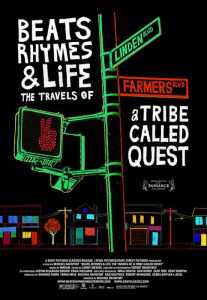 9) Beats, Rhymes, & Life: The Story Of A Tribe Called Quest: “Beats, Rhymes, & Life: The Travels of A Tribe Called Quest could signal Michael Rappaport’s transition from actor to real-deal documentary filmmaker. Blending both an overview of hip hop history dating back to the late 80s and an in-depth dissection of the conflicts that ultimately drove apart the eponymous monumentally influential rap group,Beats, Rhymes, & Life is an exquisite piece of filmmaking, the sort of offering that handily, thoroughly defeats any stodgy stigmas potentially associated with the term “documentary”. At no point is Rappaport’s film boring or inert; rather it’s vivacious, alive, brimming with energy and passion for both the broader topic of an era of hip hop long past and also the specific focus of its narrative, the seminal 1990s rap group known as A Tribe Called Quest.”
9) Beats, Rhymes, & Life: The Story Of A Tribe Called Quest: “Beats, Rhymes, & Life: The Travels of A Tribe Called Quest could signal Michael Rappaport’s transition from actor to real-deal documentary filmmaker. Blending both an overview of hip hop history dating back to the late 80s and an in-depth dissection of the conflicts that ultimately drove apart the eponymous monumentally influential rap group,Beats, Rhymes, & Life is an exquisite piece of filmmaking, the sort of offering that handily, thoroughly defeats any stodgy stigmas potentially associated with the term “documentary”. At no point is Rappaport’s film boring or inert; rather it’s vivacious, alive, brimming with energy and passion for both the broader topic of an era of hip hop long past and also the specific focus of its narrative, the seminal 1990s rap group known as A Tribe Called Quest.”
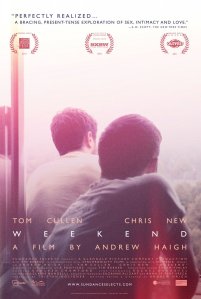 8) Weekend: (To be reviewed.) Whenever films enjoy widespread comparisons to critically lauded past releases, I endeavor to avoid making the same connections myself in my own reviews so as not to seem like I’m just nodding my head along with my peers and superiors. In the case of Andrew Haigh’s Weekend, I can’t escape the inarguable kinship shared between his excellent story of two homosexual men spending a night together and subsequently wrestling with the notion of fashioning a meaningful relationship from their hook-up, and Richard Linklater’s masterful Before Sunrise/Sunset duo. Russell (Tom Cullen) and Glen (Chris New) are no Jesse and Céline; they’re individuals in their own right, with their own hang-ups and anxieties and worries and baggage, and their story is engaging, challenging, and most of all moving. Maybe a gay audience will derive more from the film, but issues of sexuality aside there’s a universality to their conflict that’s brave and touching and true.
8) Weekend: (To be reviewed.) Whenever films enjoy widespread comparisons to critically lauded past releases, I endeavor to avoid making the same connections myself in my own reviews so as not to seem like I’m just nodding my head along with my peers and superiors. In the case of Andrew Haigh’s Weekend, I can’t escape the inarguable kinship shared between his excellent story of two homosexual men spending a night together and subsequently wrestling with the notion of fashioning a meaningful relationship from their hook-up, and Richard Linklater’s masterful Before Sunrise/Sunset duo. Russell (Tom Cullen) and Glen (Chris New) are no Jesse and Céline; they’re individuals in their own right, with their own hang-ups and anxieties and worries and baggage, and their story is engaging, challenging, and most of all moving. Maybe a gay audience will derive more from the film, but issues of sexuality aside there’s a universality to their conflict that’s brave and touching and true.
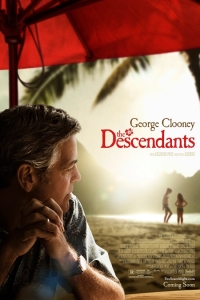 7) The Descendants: “The Descendants‘ derives plot from tragedy, but eschews a somber atmosphere; instead the film mines for hope, specifically in Matt’s renewed relationships with his daughters. Traces of the cutting human parodies found in many of Payne’s other films abound, but those elements don’t shape the tone of the story significantly enough to be dominating.The Descendants, through exploration of Matt’s circumstances, flirts with darkness without succumbing to it, just as Matt strives to confront and overcome his personal pain rather than allow it to bury him. Put succinctly, this is a film about facing grief by facing ourselves.”
7) The Descendants: “The Descendants‘ derives plot from tragedy, but eschews a somber atmosphere; instead the film mines for hope, specifically in Matt’s renewed relationships with his daughters. Traces of the cutting human parodies found in many of Payne’s other films abound, but those elements don’t shape the tone of the story significantly enough to be dominating.The Descendants, through exploration of Matt’s circumstances, flirts with darkness without succumbing to it, just as Matt strives to confront and overcome his personal pain rather than allow it to bury him. Put succinctly, this is a film about facing grief by facing ourselves.”
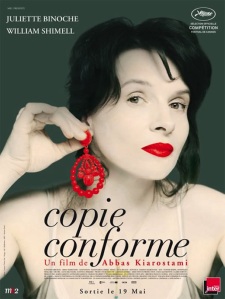 6) Certified Copy: (To be reviewed.) Interesting that two films released in the same year should call back so strongly to the work of Richard Linklater, but Certified Copy is far more complex than Weekend and has more in common with Rosselini’s Viaggio in Italia and even Orson Welles’ F For Fake. Influences and inspirations aside, though, it’s a marvel of dialogue, acting, and staging by Iranian film maestro Abbas Kiarostami. Kiaorostami assigns the brunt of the labor here to the luminous Juliette Binoche and her co-star William Shimmel; Certified Copy is entirely about them, and through them it’s about the nature of human dependency, how people connect to each other, and the veracity of the relationships we forge. The film is lovely, calmly flitting through Tuscan countryside and the streets of Arezzo; it’s also heartbreakingly real and endlessly, intricately complicated.
6) Certified Copy: (To be reviewed.) Interesting that two films released in the same year should call back so strongly to the work of Richard Linklater, but Certified Copy is far more complex than Weekend and has more in common with Rosselini’s Viaggio in Italia and even Orson Welles’ F For Fake. Influences and inspirations aside, though, it’s a marvel of dialogue, acting, and staging by Iranian film maestro Abbas Kiarostami. Kiaorostami assigns the brunt of the labor here to the luminous Juliette Binoche and her co-star William Shimmel; Certified Copy is entirely about them, and through them it’s about the nature of human dependency, how people connect to each other, and the veracity of the relationships we forge. The film is lovely, calmly flitting through Tuscan countryside and the streets of Arezzo; it’s also heartbreakingly real and endlessly, intricately complicated.
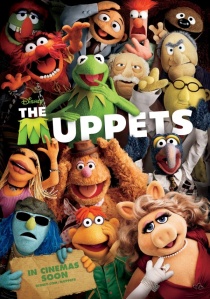 5) The Muppets: “That’s The Muppets‘ big takeaway. The Muppets represent so much to those of us who grew up with them in a way that’s nostalgic without constituting something of a sickness; they don’t call us back to happier times but rather to happiness itself. More than anything that’s Segel’s and Stoller’s goal; they’re not yearning for a time gone by but instead working to bring these characters into 2011, frequently by identifying where the Muppets stand on various scales of popularity. How do the Muppets become relevant in a world where their group persona and comedic sensibilities go against the cultural grain? Through a handful of self-deprecating jokes which identify how far adrift the Muppets are on the pop culture radar, but also with a climactic dance number in which the film states that for as long as the characters have been gone, they haven’t been forgotten.”
5) The Muppets: “That’s The Muppets‘ big takeaway. The Muppets represent so much to those of us who grew up with them in a way that’s nostalgic without constituting something of a sickness; they don’t call us back to happier times but rather to happiness itself. More than anything that’s Segel’s and Stoller’s goal; they’re not yearning for a time gone by but instead working to bring these characters into 2011, frequently by identifying where the Muppets stand on various scales of popularity. How do the Muppets become relevant in a world where their group persona and comedic sensibilities go against the cultural grain? Through a handful of self-deprecating jokes which identify how far adrift the Muppets are on the pop culture radar, but also with a climactic dance number in which the film states that for as long as the characters have been gone, they haven’t been forgotten.”
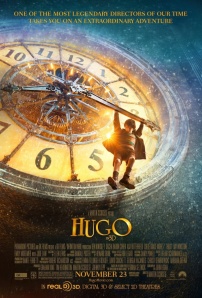 4) Hugo: “With Méliès’ identity in the open, Hugo becomes something of a personal thank you note from Scorsese to cinema as a medium. Yes, there’s absolutely no question that he’s paying tribute specifically to Méliès here, but there’s very much a sense in the film’s second half that it’s not just Méliès Scorsese is paying homage to but cinema itself. Intrinsically, Hugo is a film about why we fall in love with the movies and why they matter to us at all; it’s about the delight and catharsis of discovering the magic of the movies for yourself. And indeed, Hugo poses the argument that films by their very nature are magical– we’re told that Méliès got his start as a magician and saw in film the opportunity to perpetrate illusions more grand than he could possibly imagine. Movies are magic made manifest, in their fashion, and yet despite being fabrications they nonetheless possess the power to heal us, bring us together, make us whole again. Hugo is populated with characters who are missing one thing or another in their lives, whether it’s love or simple companionship or dignity or their sense of self, and the entire picture builds up to them being fixed– as Hugo fixes his clocks, the automaton, and eventually Méliès himself– by cinema.”
4) Hugo: “With Méliès’ identity in the open, Hugo becomes something of a personal thank you note from Scorsese to cinema as a medium. Yes, there’s absolutely no question that he’s paying tribute specifically to Méliès here, but there’s very much a sense in the film’s second half that it’s not just Méliès Scorsese is paying homage to but cinema itself. Intrinsically, Hugo is a film about why we fall in love with the movies and why they matter to us at all; it’s about the delight and catharsis of discovering the magic of the movies for yourself. And indeed, Hugo poses the argument that films by their very nature are magical– we’re told that Méliès got his start as a magician and saw in film the opportunity to perpetrate illusions more grand than he could possibly imagine. Movies are magic made manifest, in their fashion, and yet despite being fabrications they nonetheless possess the power to heal us, bring us together, make us whole again. Hugo is populated with characters who are missing one thing or another in their lives, whether it’s love or simple companionship or dignity or their sense of self, and the entire picture builds up to them being fixed– as Hugo fixes his clocks, the automaton, and eventually Méliès himself– by cinema.”
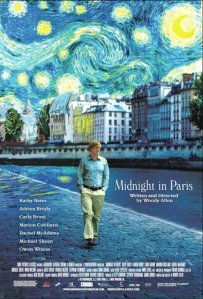 3) Midnight in Paris: “Midnight in Paris doesn’t require much heavy lifting from its audience, but I think it’s a mistake to equate light storytelling with a lack of depth or subtext. Allen’s film very much remains packed with meaning but never does a moment go by where the search for interpretive meaning takes precedent over enjoying the way the director deploys his narrative. There’s a definite sense that he’s not trying to make a statement with his film as much as he’s just trying to tell a good story artfully and vividly as well as pay tribute to one of the world’s great cities across two very distinct time periods.”
3) Midnight in Paris: “Midnight in Paris doesn’t require much heavy lifting from its audience, but I think it’s a mistake to equate light storytelling with a lack of depth or subtext. Allen’s film very much remains packed with meaning but never does a moment go by where the search for interpretive meaning takes precedent over enjoying the way the director deploys his narrative. There’s a definite sense that he’s not trying to make a statement with his film as much as he’s just trying to tell a good story artfully and vividly as well as pay tribute to one of the world’s great cities across two very distinct time periods.”
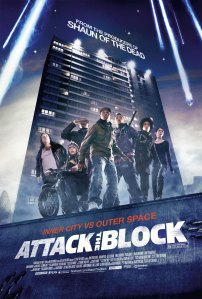 2) Attack the Block: “You’ve seen movies like Attack the Block before– movies where an enemy-of-all emerges and threatens to destroy, devour, or dominate all life until being defeated by a thoroughly ordinary hero or group of heroes– yet Joe Cornish’ directorial debut stands out as one of the year’s most thoroughly original and memorable releases regardless. Largely, this comes down to elements of origination and background; while the Shauns of the world are well-meaning (if flawed), the teens at the heart of Attack the Block initially have no problem with simply mugging you and fleeing into the night. It’s amazing how refreshing a change in perspective can be.”
2) Attack the Block: “You’ve seen movies like Attack the Block before– movies where an enemy-of-all emerges and threatens to destroy, devour, or dominate all life until being defeated by a thoroughly ordinary hero or group of heroes– yet Joe Cornish’ directorial debut stands out as one of the year’s most thoroughly original and memorable releases regardless. Largely, this comes down to elements of origination and background; while the Shauns of the world are well-meaning (if flawed), the teens at the heart of Attack the Block initially have no problem with simply mugging you and fleeing into the night. It’s amazing how refreshing a change in perspective can be.”
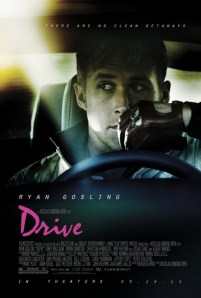 1) Drive: “I think to other directors, “cool” is important because it helps sell and carve out a niche for their movie. For Refn, “cool” matters because in his view anything that’s so indescribably cool as Drive, or Drive‘s characters, is hiding part of itself away from the peering eyes of the world. Clearly Refn sought to mine each of his characters and unveil what each of them has tucked away inside themselves, and it’s that synthesis of compelling stylization and outstanding character work that makes Drive so great. You will not see a film that so meticulously develops its principle and supporting players or is so hypnotically stylish in 2011 as this; it’s the rare sort of picture that’s having its cake and eating it without conveying airs of pretension or a more general contumeliousness in the process.”
1) Drive: “I think to other directors, “cool” is important because it helps sell and carve out a niche for their movie. For Refn, “cool” matters because in his view anything that’s so indescribably cool as Drive, or Drive‘s characters, is hiding part of itself away from the peering eyes of the world. Clearly Refn sought to mine each of his characters and unveil what each of them has tucked away inside themselves, and it’s that synthesis of compelling stylization and outstanding character work that makes Drive so great. You will not see a film that so meticulously develops its principle and supporting players or is so hypnotically stylish in 2011 as this; it’s the rare sort of picture that’s having its cake and eating it without conveying airs of pretension or a more general contumeliousness in the process.”
These aren’t the only films worth savoring and remembering as we leave 2011 behind us; many could have made the cut but didn’t, and many (The Artist, War Horse, The Girl With the Dragon Tattoo, Young Adult, A Separation, The Interrupters, Incendies, Shame, Melancholia, and more) I didn’t get the chance to see. But if these were the only films you’ve seen this year, you’ve done well for yourself. I know they’ll remain in my memory for some years to come.
So thanks, 2011. Thanks for a lot of wonderful movies. Thanks for the chance to interact with other dedicated, thoughtful, intelligent, and hard-working bloggers who have the same passion as me– talking with them and learning with them and sharing my love for the cinema with them this year has been immensely rewarding and I can’t wait to start delving into 2012’s offerings to continue that process. Most of all, though, thanks to my wife, who has been my biggest supporter since ACVF’s formation, and with whom I look forward to the start of a better, brighter year come January 1st.
See you all in 2012!
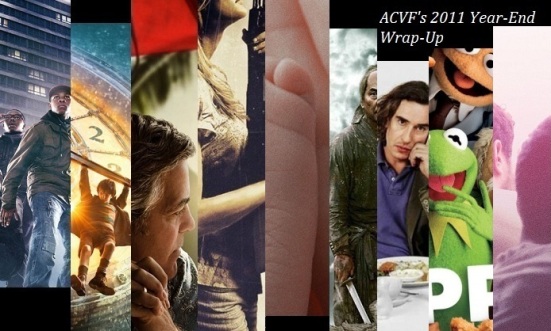
Pingback: G-S-T Year In Review – Andrew’s 2011 Wrap Up | GO, SEE, TALK!
Pingback: Everybody’s Talkin’ 12 – 29 (Year-End Chatter from Other Bloggers) | The Matinee | Cinematic Passion & Perspective | The Matinee | Cinematic Passion & Perspective
I agree with all the movies I’ve seen on this list being worthy of some one’s “Top Ten”. No doubt. In fact, we’ve got four, perhaps 5 (still finalizing) in common.
You have enough “street cred” (LOL) to put “Certified Copy” and “Weekend” on my radar. I’ve already seen you recommend “13 Assassins” and “Beats, Rhymes and Life”.
Once things settle down, I’ll give them all a looksee…
The one movie I think you and I disagree on (and only by degrees) is “Hugo”, we’ve discussed it previously. I like the ideas much more than the execution. LOL
Meanwhile, I owe you one on “Midnight in Paris.” If it hadn’t been for you keeping that poster on your site for as long as you have, my resistance to it may not have been overcome (not a huge Woody Allen fan, and the high concept didnt sound appealing to me… I was totally wrong).
We hit a lot of the same notes– except for a couple (*cough*Hugo*cough*)– which I’m not at all surprised by based on our back-and-forth over most of them. So, there’s that.
Watch Weekend and Certified Copy! In fact, watch them together! They’re both blood relatives of Linklater’s Sunrise/Sunset films, Weekend maybe much more than Copy (though Copy draws from plenty of other films); I do warn you, Weekend is graphically sexual, which for some could be outside of their comfort zone. Didn’t bother me, but your mileage may vary– it’s incredibly touching regardless. Copy is for me the stronger film overall, but Kiarostami is Kiarostami. He’s kind of awesome.
I still find it a total king bummer that Hugo didn’t strike you as it did me. But we’ve been over that.
Midnight was my biggest surprise this year. Attack the Block and Drive both have a better guarantee of quality given where they come from, but Allen’s been backsliding very much so recently. Paris is easily his strongest film in about half a decade and change, and a strong film even on its own right. I’m glad I turned you around on that one– in a year where consensus is impossible, it seems that Paris is one of the most universally loved pictures out there. Only Drive can stand next to it in terms of the amount of love directed at it.
Yeah, you know, Attack the Block almost made it too.
Its hard! Thats why I was busting your chops about 15… a couple of times I was so tempted to put it at 12. Like, who cares, I’m making the rules… LOL
Anyways, Before Sunrise is coming soon. I should have watched it a long time ago, I love Dazed, I’m actually a big fan of “A Scanner Darkly”, too. So… I should give them a shot for the man.
Down both Before films in succession. You won’t be disappointed. If you ARE, then, hell, you’re on your own, bud.
I had a harder time making a list this year than last year, but that has probably as much if not more to do with quantity than quality, I think.
Great list man. A few in your top ten pop up in mine as well.
Seems to be the case across most blogs– no wide consensus but a big spread of shared picks.
I had a hunch that Drive would be your number one, but I thought I Saw the Devil would manage its way into the top ten.
You know, given time, I came to realize that I love that movie– but not quite as much as everything else on here. Still, I Saw the Devil is really, really great and very worthy of being included on any top X list.
I just finished that this week. The brutality is hard to watch, but damn if the leads don’t hold your focus with vice-like grip.
You and I are on the same page with 13 Assassins…simply brilliant. Love it to no end. The Descendants was the first Payne film that really got through to me and but I’ll stop here as I think we could rave about Drive all day long:) Smooth list Andrew!
We could do a talking-head “hey isn’t Drive a great movie” thing that goes on for several thousand words, I think. Let’s avoid that. For now.
13 Assassins is one of the best things Miike has done, recently, and I think very deserving of all the love not just as a Miike film but as a real-deal samurai jidaigeki film. Definitely a good pick, I think.
Another great list of films I have yet to see! Thanks for broadening my horizons!
No problem, Hook! Check ’em all out as you can and let me know what you think!
Great, great list. Drive, Attack the Block, Hugo and 13 Assassins will all almost certainly be in my top ten as well. Nice to see Beats, Rhymes & Life listed; that’s something I have been meaning to see for a while now.
Thanks Eric! Cool to see we agree on a few picks– they all really struck a chord with me.
Beats spoke to me very personally, and so far remains the best 2011 doc I’ve seen. Maybe that’ll change when I see The Interrupters or Project Nim, but who knows.
Great list, Andrew! My top 5 are: 1. The Girl with the Dragon Tattoo, 2. Drive, 3. I Saw the Devil, 4. Mission Impossible: Ghost Protocol, 5. 50/50. I really want to see what you think of Dragon Tattoo. I really did not like the Swedish adaptation. I found it extremely lacking in both style and substance which I felt Fincher absolutely remedies. I also felt he gave it a pulse and an emotional resonance (others might disagree).
I’ll try to check it out. I really don’t care for the original version and I have a feeling that a lot of that has to do with the source material’s adaptability, so I can’t say I’m that excited to see what Fincher does with it at this point– especially given how mixed the response to it has been.
I fell like Steven Zaillian really streamlined it, and Fincher brought out the best in the relationship between Blomkvist and Salander. Also, Fincher’s attention to detail and pacing are top notch. I really like how he deals with process, a perfect example of this would be Zodiac. I really want you to see it so we can finally disagree on something maybe. I’m up to the challenge. 🙂
I’ve seen a whopping 4 of these, and there’s a chance that all 4 could end up in my top 10 as well. Moreover, as always, your passion and eloquence for films you love (and hate) will draw me ever closer to those not yet seen. Happy moviegoing in 2012, Andrew – I’m glad you enjoyed 2011 as much as you did (and much more than I), but 2012 looks to be even better!
Only four? Well, make sure you see ’em all, just because I liked them.
I think 2012 is going to be really rewarding– there are just a ton of movies from talented filmmakers ready to be released, some who we haven’t heard from in half a decade or more. But this was a good year, I think, though I’m shocked to find a ton of other, better established critics over the web bemoaning the year as being “good but not great”.
Thanks for the kind words, Dylan. I really do appreciate them.
I need to go check, but I’m pretty sure my 2011 films seen tally is well under 60 when it’s normally in the 80+ range. Perhaps once I see more of them, my opinion of 2011 as a whole will go up.